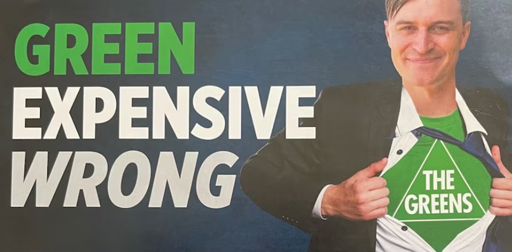Okay, so what we need to get these laws passed is the Unions to come up with false and misleading advertisements about Dutton, the Nationals, and Albanese, in the next week or two before this next election is called, and sit back and watch the amendments sail through with the full support of the opposition.
“If the Unions are doing it, it must be wrong!” Some Liberal staffer, probably.
I doubt they would need to enact truth in political advertising laws for that. Dutton and his colleagues have shown a willingness to flex defamation laws when people say things that make them feel sad. They are also privileged enough to be among the few who have the financial means to pursue those kinds of actions.
My guess is you’d end up with a bunch of strategically expensive defamation actions that are intended to tie up those sort of advertisements until after the election.
Now, if it was something that would stop the Greens or teals from building more support? Watch that fly through Parliament with bipartisan approval.
I think the Unions are still big enough to deal with the threat of frivolous defo suits. Or, more importantly, they’re large enough that the wealthy have to think twice.
Truth is a philosophical construct.
What we need are verifiable facts based on tested reality.
Okay, sure. Our only difference is we’re working off different meanings of truth for this.
To this,
Truth needs to be verifiable in these situations, otherwise it can’t be established and actionable.
Even if someone is telling the truth, if they cannot prove that truth, the ‘rest’ (other people) cannot rely on it.
Edit: so the definition of truth i’m working from agrees with your demand for these situations to have verifiable facts.
Might be difficult to properly assign who decides the truth.
Judges and Scientific Journals, I guess?
It really isn’t as hard as you imagine.
Government functionary bodies, enforce legislated demands for truth in national life all the time, ACCC (consumer protection laws, advertising), ASIC (company reporting), Fuel regs (notice those little check signs on each bowser), nutritional standards, and all the others, finally AEC already has responsibilities in this area, just not in the whole time period, which is what this article is about.
A tiny amount of the cases these regulatory bodies deal with ever end up in court. Even the mention of further action gets compliance in more cases than not. You could describe the presence and continuance of this system as a positive example of a chilling effect.
In this case, the mere presence of our system, acting against misleading and lying behaviour, acts as deterence in itself.
Backing this up with a predictable and ascending order of approbium, corrections and punishments reinforces the expectations of the functionality of the system.
For sure, but I still think there is enough room for bad actors that I would need to see a plan before agreeing to the notions of a plan, but I’m not Australian so my opinion doesn’t really matter here.
Like for example, the USA currently has a policy removing all mentions of trans, nonbinary, and certain pronouns from government websites. They’re also gutting climate science and infectious disease research publications they previously hosted. So, you know, make sure you dudes outline who and why something can be stricken down when you implement the process of taking things down.
I think the United States has probably always been in a different spot on trust in institutions from Australia, NZ and UK, (don’t know about Canada). Maybe it goes back as far as the founding fathers and the structure of the Constitution, but the Australian Constitution is heavily based off the US, sonit cant be the whole story. And as Anthony Scaramucchi noted on Rest is Politics, a lot of authoritarian States have very similarly worded Constitutions to the US.
Maybe its simply the amount of political appointees that remain politically motivated in their procedural capacities. So many appointments are made by inckming administrations, then the legal system Judicial arms race, elections for Sheriffs.
Or maybe its neither of these things, maybe the United States has always had less cohesive political positions between each other, and the success, wealth, and strength of the country has meant the people of the Nation haven’t been put in a position where they’re forced to reconnoitre with their erstwhile political enemies.
Or maybe its something else, but the US’s individualism and distrust of… authority? Institutions? I don’t know, has definitely been a difference between our Nations.
If anything I’d say UK is worse in that metric in the same timeframe.
Hmm, maybe.
I always found the british are more cynical, which makes it seem like they have less trust. But when you observe their behaviour i think they’re more trusting of institutions, than the Americans.
I think an interesting example of Britain’s trust in their Government is all the Leave voters thinking the Boris Johnson, Farage types actually had a plan for brexit, beyond corruption. I think thats evident in the amount of leave voters who have switched their own assessments.
Comparing that to the US theres no signs of changes to population divisions or sentiments about the other side or Government. Of course all sides have truths to point to, where resolutions to those truths aren’t delivered, which doesn’t help any healing or moving on prospects.
I’ve found Americans can be super positive people about all kinds, but its almost a social sin to speak well of government services. Of course, i’m speaking in the broadest possible terms here, i can think of a friend in NY who undermines this argument a little.
Doesn’t help the UK have one of the most aggressive medias in the world. They’ll oerblow a straight banana, if they could… oh… wait…
If this is an ad, I don’t know what to think…
I think they want to persuade you that the Greens have a nefarious plan to turn all the old telstra phone boxes into streetside change rooms.





